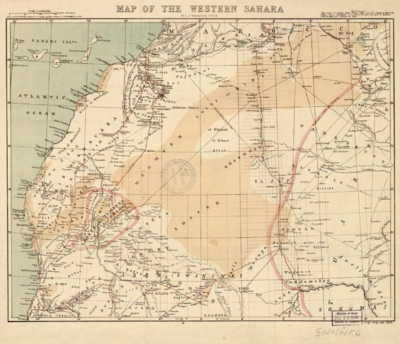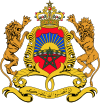This is an old revision of this page, as edited by EllenLibrarian (talk | contribs) at 20:22, 13 November 2018 (→History: Added citations). The present address (URL) is a permanent link to this revision, which may differ significantly from the current revision.
Revision as of 20:22, 13 November 2018 by EllenLibrarian (talk | contribs) (→History: Added citations)(diff) ← Previous revision | Latest revision (diff) | Newer revision → (diff)| Some of this article's listed sources may not be reliable. Please help improve this article by looking for better, more reliable sources. Unreliable citations may be challenged and removed. (July 2007) (Learn how and when to remove this message) |


Greater Morocco is a label historically used by some Moroccan nationalist political leaders protesting against Spanish, Portuguese, Algerian and French rule, to refer to wider territories historically associated with the Moroccan sultan. Current usage most frequently occurs in a critical context accusing Morocco, largely in discussing the disputed Western Sahara, of irredentist claims on neighbouring territories.
The main competing ideologies of the Greater Morocco ideology have been Sahrawi nationalism, Mauritanian irridentism, Spanish nationalism, Berber separatism and Pan-Arabism.
Irredentists, official and unofficial Moroccan claims on territories viewed by Moroccans as having been under some form of Moroccan sovereignty (most frequently with respect to the Spanish exclaves), are rhetorically tied back to an accused expansionism. However, Moroccan government claims make no current reference to the greater Morocco concept.
History
In 1963, following the Independence of Algeria, Morocco attacked a strip of its south-western regions (Tindouf Province and Béchar Province), claiming that parts of them were previously under Moroccan sovereignty. There were several hundred casualties. French sources reported Algerian casualties to be 60 dead and 250 wounded, with later works giving a number of 300 Algerian dead.Morocco officially reported to have suffered 39 dead. Moroccan losses were probably lower than the Algerians' but are unconfirmed, with later sources reporting 200 Moroccan dead. About 57 Moroccans and 379 Algerians were taken prisoner.After a month of fighting and some hundreds of casualties, the conflict stalemated (see Sand War).
In the early stages of decolonisation certain elected Moroccan politicians, in particular some members of the Istiqlal party, like Allal al-Fassi, the sole advocate of "total liberation" who refused to enter France even to meet with his Monarch or long-standing nationalist colleagues, were in favor of claiming wider territories historically associated in some way with the Moroccan Sultan. This was initially not supported by the Sultan (later King) of Morocco. Al-Fassi's ambitions gained more support in parliament in the beginning of the sixties, leading to a delay in the recognition of Mauritania (independent in 1960, not recognised by Morocco until 1969).
Al-Fassi's wider claims were effectively abandoned in the later sixties, although Morocco claims Western Sahara and the Spanish plazas de soberanía on its northern coast. Morocco's refusal to accept its post-colonial borders in the case of Western Sahara has put it on a collision course with the African Union, which holds this as one of its principles. As a consequence, Morocco is the only African country to step out of the union, because the Polisario Front, representing the Sahrawi Arab Democratic Republic was awarded a seat.
After Moroccan independence in 1956 and the death of King Mohammed V, the government of King Hassan II laid claim on several territories, successfully acquiring the Tarfaya Strip, after the Ifni War with Spain, and much of the territory around Ceuta and Melilla, as well as the acquisition of much of Spanish Sahara after Spain handed the territory to Morocco and Mauritania (see the Madrid Accords, it is still currently under dispute with the Polisario front who claim it as the Sahrawi Arab Democratic Republic
Recently in 2002, an armed incident erupted between Morocco and Spain, regarding the uninhabited Perejil Island, located 250m off the Moroccan northern coast. On July 11, 2002 a group of Moroccan soldiers set up base on the islet. The Moroccan government said that they set foot on the island in order to monitor illegal immigration, which was denied by the Spanish government since there had been little co-operation in the matter by that time (a repeated source of complaint from Spain). After protests from the Spanish government, led by José María Aznar, the soldiers were replaced by Moroccan navy cadets who then installed a fixed base on the island. On the morning of July 18, 2002 Spain launched a full-scale military operation to take over the island. The operation was successful and the Moroccan navy cadets were dislodged from the island in a matter of hours without offering any resistance to the Spanish Grupo de Operaciones Especiales (commando) attack force. The islet is now deserted.
See also
- Western Sahara
- Sand War
- Scramble for Africa
- Berlin Conference
- Spanish Morocco
- Plazas de soberanía
- Perejil Island
- List of Spanish colonial wars in Morocco
- List of irredentist claims or disputes
- Cold War
- Allal al-Fassi
- Irredentism
References
- Conflict and conquest in the Islamic world : a historical encyclopedia. Mikaberidze, Alexander,. Santa Barbara, Calif. ISBN 9781598843378. OCLC 763161287.
{{cite book}}: CS1 maint: extra punctuation (link) CS1 maint: others (link) - 1946-, Clodfelter, Micheal, (2008). Warfare and armed conflicts : a statistical encyclopedia of casualty and other figures, 1494-2007 (3rd ed ed.). Jefferson, N.C.: McFarland & Co. ISBN 9780786451715. OCLC 318813041.
{{cite book}}:|edition=has extra text (help);|last=has numeric name (help)CS1 maint: extra punctuation (link) CS1 maint: multiple names: authors list (link) - O., Hughes, Stephen (2001). Morocco under King Hassan (1st ed ed.). Reading, U.K.: Ithaca. ISBN 0863722857. OCLC 47150173.
{{cite book}}:|edition=has extra text (help)CS1 maint: multiple names: authors list (link) - Conflict and conquest in the Islamic world : a historical encyclopedia. Mikaberidze, Alexander,. Santa Barbara, Calif. ISBN 9781598843378. OCLC 763161287.
{{cite book}}: CS1 maint: extra punctuation (link) CS1 maint: others (link) - 1946-, Clodfelter, Micheal, (2008). Warfare and armed conflicts : a statistical encyclopedia of casualty and other figures, 1494-2007 (3rd ed ed.). Jefferson, N.C.: McFarland & Co. ISBN 9780786451715. OCLC 318813041.
{{cite book}}:|edition=has extra text (help);|last=has numeric name (help)CS1 maint: extra punctuation (link) CS1 maint: multiple names: authors list (link) - O., Hughes, Stephen (2001). Morocco under King Hassan (1st ed ed.). Reading, U.K.: Ithaca. ISBN 0863722857. OCLC 47150173.
{{cite book}}:|edition=has extra text (help)CS1 maint: multiple names: authors list (link) - ^ Douglas E. Ashford, Johns Hopkins University, The Irredendist Appeal in Morocco and Mauritania, The Western Political Quarterly, Vol. 15, No. 5, 1962-12, p. 641-651, p.645 "The sole advocate of "total liberation" was Allal al-Fassi, who refused to enter France even to meet with his Monarch or long-standing nationalist colleagues."
- Douglas E. Ashford, p. 646
- Greater Morocco Archived 2011-07-24 at the Wayback Machine
- Linnee, Susan (July 23, 2002). "Spain and Morocco agree to differ over Perejil". The Independent. London. Retrieved May 22, 2010.
| Irredentism | |
|---|---|
| Africa | |
| North America | |
| South America | |
| Western Asia | |
| Southern Asia | |
| Eastern and Southeastern Asia | |
| Central and Eastern Europe | |
| Southern Europe | |
| Italy | |
| Northern Europe | |
| Western Europe | |
| Oceania | |
| Related concepts: Border changes since 1914 · Partitionism · Reunification · Revanchism · Revisionism · Rump state | |
| Morocco articles | ||||||||||||
|---|---|---|---|---|---|---|---|---|---|---|---|---|
| History |
|  | ||||||||||
| Geography | ||||||||||||
| Politics | ||||||||||||
| Economy | ||||||||||||
| Culture |
| |||||||||||